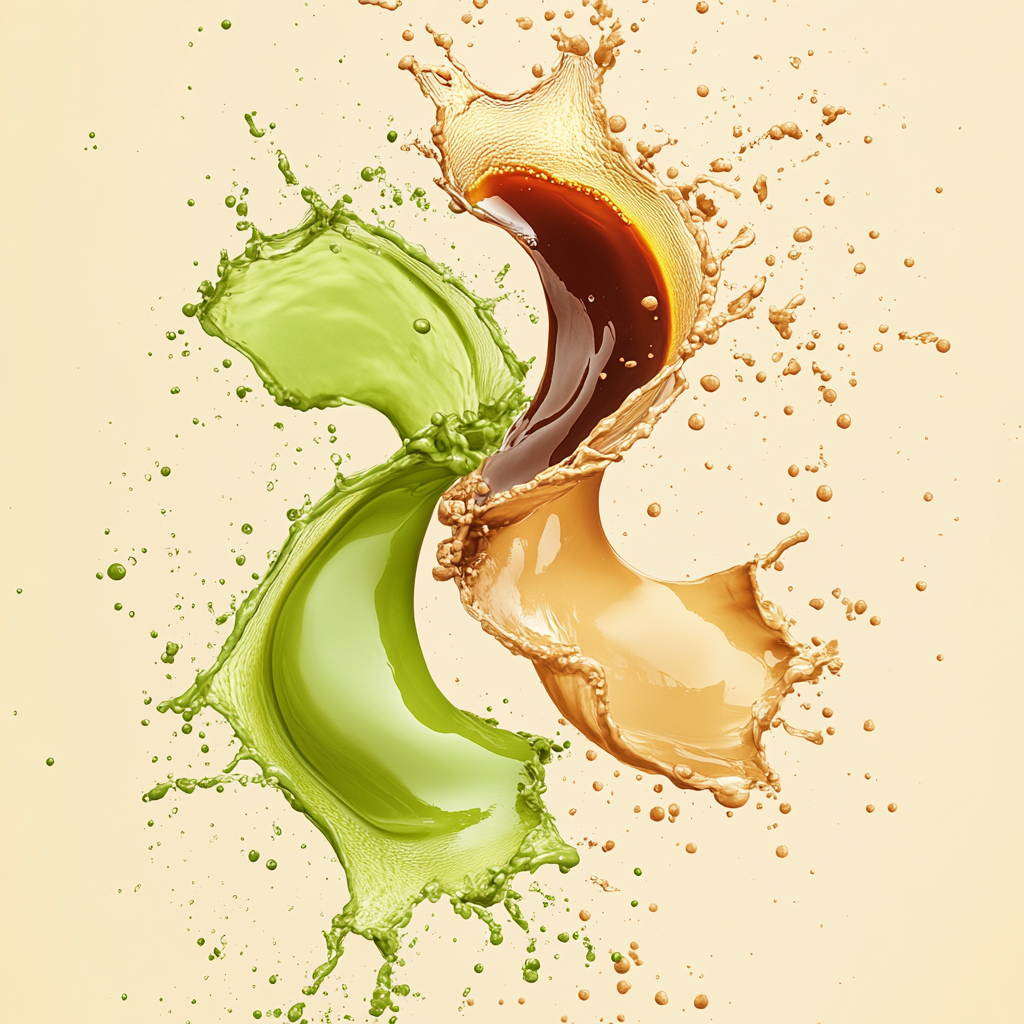
Caffeine: the world’s most consumed psychoactive substance. It’s renowned for its ability to boost alertness and energy but equally infamous for jitters, crashes, and disrupted sleep. So, is caffeine a productivity enhancer, a health ally, or a hidden stressor?
The truth? It can be all three.
The Science of Caffeine: Friend or Foe?
Caffeine works by blocking adenosine, a neurotransmitter that signals fatigue, creating that “awake and alert” feeling. But it’s not without drawbacks. Excessive or poorly timed caffeine consumption can lead to:
- Jitters and anxiety: Especially in individuals predisposed to anxiety disorders[1].
- Energy crashes: A result of overstimulation followed by a dip in energy.
- Sleep disruption: Caffeine delays sleep onset and reduces deep sleep quality when consumed too late in the day[3][8].
- Cortisol spikes: Elevated cortisol levels from caffeine can exacerbate stress and hormonal imbalances, particularly in women[2][4].
- Skin dehydration: As a diuretic, caffeine can dehydrate the skin, leading to dryness and premature aging[4].
Caffeine Content: A Comparison of Popular Drinks
Espresso (1 shot, 30ml) | 63–75 mg | Small but potent |
Black Coffee (240ml) | 95–120 mg | Highly variable |
Green Tea (240ml) | 25–45 mg | L-theanine buffers effects[7] |
Matcha (1 tsp) | 35–70 mg | Sustained release due to whole-leaf consumption[5] |
Energy Drink (Red Bull, 250ml) | 80 mg | Often includes sugar and additives |
Monster/Other 500ml cans | 160–300 mg | High caffeine content |
Pre-Workout Supplement | 150–400 mg | Often stacked with other stimulants |
Soft Drinks (e.g., Coke) | 30–45 mg | Includes sugar and carbonation |
Dark Chocolate (40g) | 12–20 mg | Mild but cumulative |
Decaf Coffee | 2–5 mg | Trace amounts remain |
⚠️Safe daily limit:~400mg for most adults [6].
For sensitive individuals, pregnant people, or those prone to anxiety, even 100mg may be excessive [2].
Conscious Caffeination: How to Optimize Your Intake
1. Pair Caffeine with L-Theanine
L-theanine, an amino acid found in tea leaves, promotes relaxation and reduces stress by modulating neurotransmitter activity. When combined with caffeine, it enhances focus while minimizing jitteriness [7].
✨ Think “calm energy” instead of wired chaos.
2. Time Your Caffeine Wisely
Best window: 90–120 minutes after waking. Drinking caffeine immediately upon waking can blunt your natural cortisol rise[4].
Cut-off time: Avoid caffeine after 2–3pm to protect sleep quality. Evening caffeine delays sleep onset and reduces deep sleep intensity[8].
3. Choose Quality Over Quantity**
- A single cup of matcha or green tea can outperform multiple cups of low-quality coffe - thanks to polyphenols, antioxidants, and a smoother caffeine release[5].
- Avoid sugar-laden energy drinks that spike blood sugar alongside caffeine.
4. Cycle Your Intake
To prevent tolerance and adrenal fatigue:
- Take “caffeine deload” days once or twice a week.
- Swap coffee for herbal teas or decaf green tea on these days.
5. Stay Hydrated and Nourished
Caffeine is mildly dehydrating and appetite-suppressing:
- Always pair caffeine with water to counteract dehydration[4].
- Avoid drinking it on an empty stomach—it can spike cortisol and cause blood sugar fluctuations[2].
The New Standard: Conscious Caffeination
Gone are the days of mindless coffee consumption fueled by hustle culture. Conscious caffeination means using caffeine as a tool—not a crutch—by choosing smarter sources, respecting your biology, and timing your intake thoughtfully.
Functional beverages like green tea, matcha, and adaptogenic blends offer a balanced alternative—supporting focus, mood, and metabolism with fewer trade-offs.
Caffeine can be your ally… when you sip with intention.
The Caffeine Smarts Cheat Sheet
Drink caffeine after waking - Preserves natural cortisol rhythm
Choose green tea or matcha - Lower dose, smoother energy curve
Avoid caffeine on an empty stomach - Protects cortisol + blood sugar levels
Cut off by mid-afternoon - Preserves sleep quality
Pair with L-theanine - Reduces anxiety; promotes calm focus
Conscious caffeination isn’t about restriction.
Sip smarter for better energy, focus, and well-being.
Citations:
[1] https://www.webmd.com/balance/features/brewing-trouble
[2] https://mixhers.com/blogs/articles/sip-smart-understanding-caffeines-hidden-effects-on-womens-hormones
[3] https://pmc.ncbi.nlm.nih.gov/articles/PMC6230475/
[4] https://www.direct-aesthetics.com/how-morning-coffee-damages-skin/
[5] https://cafely.com/blogs/info/caffeine-in-coffee-vs-green-black-tea
[6] https://www.drlisawatson.com/wp-content/uploads/2011/04/Caffeine-Chart4.pdf
[7] https://usecadence.com/blogs/science/what-are-the-effects-of-combining-caffeine-and-l-theanine
[8] https://www.nature.com/articles/s41598-021-84088-x
[9] https://www.womenshealthnetwork.com/adrenal-fatigue-and-stress/how-caffeine-affects-your-adrenal-health/
[10] https://www.onepeloton.com/en-GB/blog/hydrating-foods
[11] https://forwellness.com/blogs/be-well/a-complete-guide-to-the-advantages-of-adding-l-theanine-to-your-coffee
[12] https://pubmed.ncbi.nlm.nih.gov/36870101/
[13] https://www.drlamcoaching.com/blog/goodbye-effects-from-caffeine/
[14] https://www.moccamaster.eu/blog/post/coffee-food-pairings
[15] https://www.ama-assn.org/delivering-care/public-health/what-doctors-wish-patients-knew-about-impact-caffeine
[16] https://pmc.ncbi.nlm.nih.gov/articles/PMC2257922/
[17] https://www.sleepfoundation.org/nutrition/caffeine-and-sleep
[18] https://www.gbnews.com/lifestyle/how-to-look-younger-skincare-coffee-ageing-wrinkles
[19] https://www.frontiersin.org/journals/psychology/articles/10.3389/fpsyg.2024.1270246/full
[20] https://www.mebykatie.com/blog/the-impact-of-caffeine-on-your-hormones
[21] https://www.betterhealth.vic.gov.au/health/healthyliving/caffeine
[22] https://pubmed.ncbi.nlm.nih.gov/34871964/
[23] https://www.sciencedirect.com/science/article/abs/pii/S0026049507002752
[24] https://academic.oup.com/sleep/advance-article/doi/10.1093/sleep/zsae230/7815486
[25] https://mag.aestheticmed.co.uk/articles/251996?article=56-1
[26] https://www.sportsdietitians.com.au/wp-content/uploads/2015/04/110721-Caffeine-Fact-Sheet_SD-Version.pdf
[27] https://www.eatingwell.com/caffeinated-drinks-ranked-by-caffeine-levels-8607309
[28] https://www.cspinet.org/caffeine-chart
[29] https://www.washingtonpost.com/wellness/interactive/2022/coffee-vs-tea-nutrition-health/
[30] https://www.caffeineinformer.com/the-caffeine-database
[31] https://nutritionfoundation.org.nz/caffeine/
[32] https://www.theteamakers.co.uk/blogs/news/matcha-vs-coffee
[33] https://pubmed.ncbi.nlm.nih.gov/18681988/
[34] https://pmc.ncbi.nlm.nih.gov/articles/PMC3805807/
[35] https://marcellepick.com/caffeine-adrenals-paying-dearly/
[36] https://angelinos.com/blogs/news/23-coffee-and-food-pairings-that-will-change-everything
[37] https://pubmed.ncbi.nlm.nih.gov/21040626/
[38] https://www.uclahealth.org/news/release/study-mice-shows-how-chronic-caffeine-consumption-alters
[39] https://www.raowellness.com/caffeine-and-adrenal-fatigue/
[40] https://www.nespresso.com/nz/en/news/blog-coffee-and-food-pairings-that-please-the-palate
[41] https://ketone.com/blogs/blog/supplements-caffeine-and-l-theanine-the-best-combo-for-energy
[42] https://macafeine.ca/en/blogs/news-en/les-accords-cafe-et-nourriture
[43] https://en.wikipedia.org/wiki/Caffeine-induced_anxiety_disorder
[44] https://drbrighten.com/how-coffee-affects-your-health-and-hormones/
[45] https://en.wikipedia.org/wiki/Caffeine-induced_sleep_disorder
[46] https://olay.co.uk/skin-care-tips/dry-skin/how-caffeine-affects-your-skin
[47] https://coffeebros.com/blogs/coffee/how-much-caffeine-is-in-coffee-vs-tea-vs-soda
[48] https://www.math.utah.edu/~yplee/fun/caffeine.html
[49] https://naokimatcha.com/blogs/articles/why-the-caffeine-content-in-matcha-beats-coffee
[50] https://novum.coffee/en/caffeine-in-coffee-a-comparison-with-table/
[51] https://www.healthline.com/nutrition/caffeine-in-tea-vs-coffee
[52] https://www.mayoclinic.org/healthy-lifestyle/nutrition-and-healthy-eating/in-depth/caffeine/art-20049372
